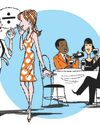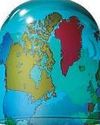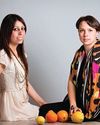Our first three years are a blur, and we don’t recall much before the age of seven. It turns out those early memories aren’t merely tucked away.

I’M THE YOUNGEST by far of five children. By the time I was six, my siblings were gone, and we went from a very noisy household to a very quiet one.
My family has told me stories about those early years before my siblings left. How my brother ambushed me around corners with a toy crocodile. How my oldest sister carried me like a kangaroo with her joey. But I can offer very few stories of my own from that time.
Hardly any adult can. There is a term for this—infantile amnesia, coined by Sigmund Freud to describe the lack of recall adults have of their first three or four years and their paucity of solid memories until around age seven. There has been a century of research about whether memories of these early years are tucked away in some part of our brains and need only a cue to be recovered. But research now suggests that the memories we form in these early years simply disappear.
Psychologist Carole Peterson of Memorial University of Newfoundland has conducted a series of studies to pinpoint the age at which these memories vanish. First, she and her colleagues assembled a group of children between the ages of four and 13 to describe their earliest recollections. The children’s parents stood by to verify the memories, and even the youngest kids could recall events from when they were around two years old.
The children were interviewed again two years later. Nearly 90 percent of the memories initially offered by those ten and older were retained. But the younger children had gone blank. “Even when we prompted them about their earlier memories, they said, ‘No, that never happened to me,’” Peterson said. “We were watching childhood amnesia in action.”
هذه القصة مأخوذة من طبعة January 2018 من Reader's Digest International.
ابدأ النسخة التجريبية المجانية من Magzter GOLD لمدة 7 أيام للوصول إلى آلاف القصص المتميزة المنسقة وأكثر من 9,000 مجلة وصحيفة.
بالفعل مشترك ? تسجيل الدخول
هذه القصة مأخوذة من طبعة January 2018 من Reader's Digest International.
ابدأ النسخة التجريبية المجانية من Magzter GOLD لمدة 7 أيام للوصول إلى آلاف القصص المتميزة المنسقة وأكثر من 9,000 مجلة وصحيفة.
بالفعل مشترك? تسجيل الدخول

The Secret Lives Of Passwords
We despise them—yet we imbue them with our hopes, dreams, and dearest memories.
7 Doctor Approved Natural Remedies
A plant fix over a prescription drug? Some doctors swear by it.
The Nature Cure
Doctors from California to South Korea believe they’ve found a miracle medicine for our mental health and creativity.

Oh, Behave!
The classiest ways to split a bill, send your sympathies,say no, and more.

World Of Medicine
News from the world of medicine.

Surviving Substandard Sleep
How to cope after a bad night’s slumber

Good News
Some of the Positive Stories Coming Our Way

Medical Mystery
THE PATIENTS: Katie*, 26, and Ella*, 24, of Boston, United StatesTHE SYMPTOMS: Late-onset speech and motor-skill delayTHE DOCTOR: Dr. David Sweetser, chief of medical genetics and metabolism at the Mass General Hospital for Children

News From The World Of Medicine
A commission of experts assembled by the medical journal

Making Yogurt, Healing Minds
How a psychologist turned entrepreneur— and helped turn around lives